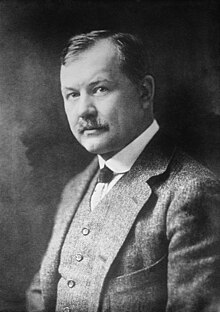Franz Lehár
You can help expand this article with text translated from the corresponding article in German. (September 2009) Click [show] for important translation instructions.
|

Franz Lehár (30 April 1870 – 24 October 1948), known in Hungarian as Lehár Ferenc, was a Hungarian[1][2][3][4][5][6] composer, mainly known for his operettas.
Biography
Lehár was born in the northern part of Komárom, Kingdom of Hungary, Austria–Hungary (now Komárno in Slovakia) as the eldest son of a bandmaster in the Infantry Regiment No. 50 of the Austro-Hungarian Army.
While his younger brother Anton entered cadet school in Vienna to become a professional officer, Franz studied violin and composition at the Prague Conservatory, where his violin teacher was Antonín Bennewitz, but was advised by Antonín Dvořák to focus on composing music. After graduation in 1899 he joined his father's band in Vienna, as assistant bandmaster. In 1902 he became conductor at the historic Vienna Theater an der Wien, where his first opera Wiener Frauen was performed in November of that year.

He is most famous for his operettas – the most successful of which is The Merry Widow (Die lustige Witwe) – but he also wrote sonatas, symphonic poems, marches, and a number of waltzes (the most popular being Gold und Silber, composed for Princess Pauline von Metternich's "Gold and Silver" Ball, January 1902), some of which were drawn from his famous operettas. Individual songs from some of the operettas have become standards, notably "Vilja" from The Merry Widow and "You Are My Heart's Delight" ("Dein ist mein ganzes Herz") from The Land of Smiles.
Lehár was also associated with the operatic tenor Richard Tauber, who sang in many of his operettas, beginning with Frasquita (1922), in which Lehár once again found a suitable post-war style. Between 1925 and 1934 he wrote six operettas specifically for Tauber's voice.
By 1935 he decided to form his own publishing house, Glocken-Verlag (“Publishing House of the Bells”), to maximize his personal control over performance rights to his works.
Lehár and the Third Reich
Lehár's relationship with the Nazi regime was an uneasy one. He had always used Jewish librettists for his operas and had been part of the cultural milieu in Vienna which included a significant Jewish contingent.[7] Further, although Lehár was Roman Catholic, his wife, Sophie (née Paschkis) had been Jewish before her conversion to Catholicism on marriage, and this was sufficient to generate hostility towards them personally and towards his work. Hitler, however, enjoyed Lehár's music, and hostility diminished across Germany after Goebbels's intervention on Lehár's part.[8] In 1938 Mrs Lehár was given the status of "Ehrenarierin" ('honorary Aryan by marriage').[9] Nonetheless, attempts were made at least once to have her deported. The Nazi regime was aware of the uses of Lehár's music for propaganda purposes: concerts of his music were given in occupied Paris in 1941. The Lehárs did not remain silent bystanders towards the regime: they presented Hitler with a 50th birthday present in 1938. Even so, Lehár's influence was limited: despite his attempts to personally secure Hilter's guarantee of the safety of one of his librettists, Fritz Löhner-Beda, he did not prevent the murder of Beda and his wife in Auschwitz-III.[10]
Later years
Franz Lehár spent most of his adult life outside of Hungary but, nevertheless, Hungarian remained his first language until his death.[11] He continued to sign his name in Hungarian fashion, family name first, with a diacritic over the "a".
He died in 1948 in Bad Ischl, near Salzburg where he was also buried. His younger brother Anton became the administrator of his estate, promoting the popularity of Franz Lehár's music.
Honours
- He was elected an honorary citizen of Sopron in 1940.
- In 1940 Hilter awarded him the Goethe-Medaille für Kunst und Wissenschaft.
- Several towns in the Netherlands have named streets after him (e.g. in Leidsche Rijn, Utrecht and Tilburg).
Stage works
Recordings
In 1947, Lehár conducted the Tonhalle Orchester Zürich in a series of 78-rpm recordings for English Decca (released in the U.S. by London Records) of overtures and waltzes from his operettas. The recordings had remarkable sound for their time because they were made using Decca's "full frequency range recording" process, one of the first commercial high fidelity techniques. These recordings were later issued on LP and CD. A compilation of his recordings has been released by Naxos Records.
References
- Bordman, Gerald. American Operetta. New York: Oxford University Press, 1981.
- Gänzl, Kurt. The Encyclopedia of Musical Theatre (3 Volumes). New York: Schirmer Books, 2001.
- Grun, Bernard. Gold and Silver: The Life and Times of Franz Lehár. New York: David McKay Co., 1970.
- Tauber, Richard. Operetta: A Theatrical History. Garden City, NY: Doubleday & Company, 1983
- Franz Lehár
- ^ http://www.questia.com/library/encyclopedia/lehar_franz.jsp
- ^ http://www.britannica.com/EBchecked/topic/335162/Franz-Lehar
- ^ http://www.encyclopedia.com/topic/Franz_Lehar.aspx
- ^ http://www.lebrecht.co.uk/lebrecht/lehar.htm
- ^ "Franz Lehar - MSN Encarta". Archived from the original on 2009-10-31.
{{cite web}}: Unknown parameter|deadurl=ignored (|url-status=suggested) (help) - ^ http://www.classical-composers.org/comp/lehar
- ^ Informationen des Kulturpolitischen Archivs im Amt für Kulturpflege. Berlin 9. Januar 1935; cited in Stefan Frey; Was sagt ihr zu diesem Erfolg. Franz Lehár und die Unterhaltungsmusik des 20. Jahrhunderts. Insel-Verlag, Frankfurt/M./Leipzig 1999, ISBN 3-458-16960-1. - 305f.; Fred K. Prieberg, a.a.O., S. 4166.
- ^ Elke Froehlich (Hrsg.): Die Tagebücher von Joseph Goebbels. Teil I Aufzeichnungen 1923–1945 Band 5. Dez 1937 – Juli 1938. K.G. Saur, München 2000, S. 313.
- ^ Stefan Frey, ibid., S. 338f.
- ^ Peter Herz: Der Fall Franz Lehár. Eine authentische Darlegung von Peter Herz. In: Die Gemeinde 24. April 1968.
- ^ Decsy, Gyula. Eurasian studies yearbook. ISBN 093192264X, University of Michigan. 1999, page 197.
External links
- Recording Alfie Boe's 'Franz Lehár: Love was a Dream'
- Free scores by Franz Lehár at the International Music Score Library Project (IMSLP)
- Musical Theatre Guide page
- Recording by Lotte Lehmann of "So war meine Mutter…Wär es nichts…" from Eva
- Vocal score to Alone at Last (1915)
- Vocal score to Gypsy Love (1911)
